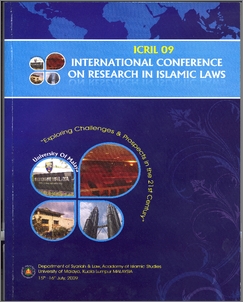Kayadibi, Saim
(2009)
Formation of the concept of Istihsān in Islamic law.
In: International Conference on Research in Islamic Law 2009 (ICRIL 09), 15-16 July 2009, Kuala Lumpur.
![[img]](http://irep.iium.edu.my/style/images/fileicons/application_pdf.png)  Preview |
|
PDF (Formation of the Concept of Istihsān in Islamic Law)
- Published Version
Download (54MB)
| Preview
|
Abstract
The concept of istihsan played a crucial role in intellectual heritage of the history of islamic law and developed Islamic legal reasoning through putting human's contribution into judgements based on primary principles of securing ease and avoiding hardship: Allah desires ease for you; and He desires not hardship for you. In the very early period of islamic legislation the sources of islamic law were confined to the Qur'an, the Sunnah and the use of personal opinion (ra'y) by the consent of the Prophet (pbuh) who is the mere authority of legislation. In the process of formation of istihsan, the concept of analogy was the main factor. When the result of qiyas would cause hardship to the people, the concept of istihsan was applied giving preference to unconsidered evidence which may eradicate hardships. No technical definition of istihsan have reached us from the very early Islamic legal history, despite the notion of istihsan has been used throughout the history of formation of islamic law. The paper intends to investigate the historical journey of istihsan that was applied, researching its traces throughout the history of Islamic legal reasoning and critically discuss their applications in Islamic law giving special emphasis on relationship with the concept of qiyas.
Actions (login required)
 |
View Item |


 Download Statistics
Download Statistics Download Statistics
Download Statistics